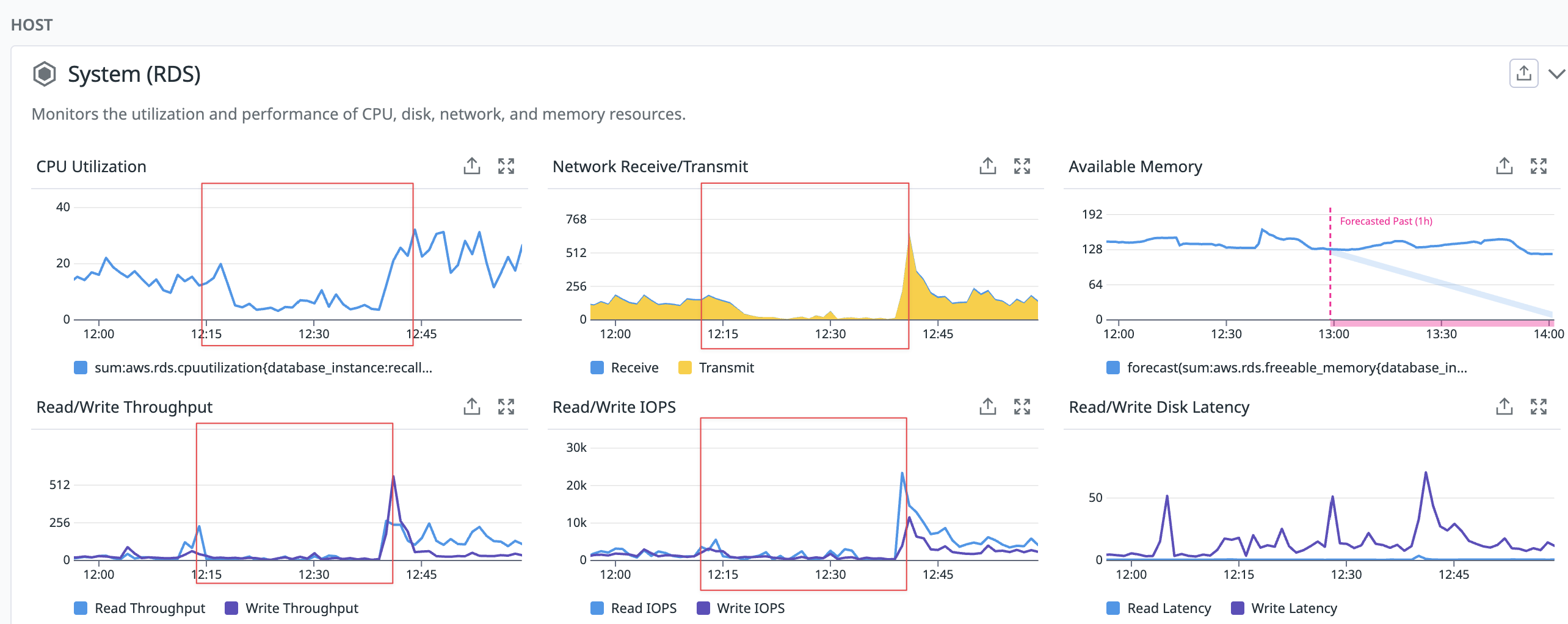At Recall.ai, we run an unusual workload. We record millions of hours of meetings every month. Each of these meetings generates a large amount of data we need to reliably capture and analyze. Some of that data is video, some of it is audio and some of it is structured data – transcription, events and metadata.
The structured data gets written to our Postgres database by tens of thousands of simultaneous writers. Each of these writers is a “meeting bot”, which joins a video call and captures the data in real-time.
We love Postgres and it lives at the heart of our service! But this extremely concurrent, write-heavy workload resulted in a stalled-out Postgres. This is the story of what happened, how we ended up discovering a bottleneck in the LISTEN/NOTIFY feature of Postgres (the event notifier that runs based on triggers when something changes in a row), and what we ended up doing about it.
Update: Fixed in Postgres core
This commit has eliminated the bottleneck in the postgres core. Credit to Joel Jacobson and the core postgres contributors for resolving this.
TL;DR
When a NOTIFY query is issued during a transaction, it acquires a global lock on the entire database (ref) during the commit phase of the transaction, effectively serializing all commits. Under many concurrent writers, this results in immense load and major downtime. Don’t use LISTEN/NOTIFY if you want your database to scale to many writers.
How we discovered it
Between the dates 2025-03-19 to 2025-03-22 our core Postgres database experienced three periods of downtime. Each of these downtimes had a similar set of symptoms:
- Massive spikes in database load and active awaiting sessions
- Database query throughput drops massively
- Database CPU, disk I/O and network traffic all plummeted
Why would increased load on the database result in a drastic drop in CPU and I/O? This was extremely surprising to us, and lead us to our first clue. We suspected increased lock contention but we didn’t have enough information to confirm if this was the root cause or a symptom given that load spikes so suddenly. Our first change was to enable log_lock_waits so we could identify the queries, connections and locks being contested.
After extended investigation we correlated the increased load with increased requests to our update endpoint, specifically our update bot endpoint, which triggered a NOTIFY query that notifies a running bot that its configuration has been updated. After combing through gigabytes of logs we spotted a flood of interesting log lines:
2025-03-22 15:16:59 UTC:10.3.206.139(34877):postgres@meeting_api:[45081]:DETAIL: Process holding the lock: 20841. Wait queue: 17474, 20898, 1931, 20926, 35855, 14865, 20846, 31717, 36912, 20927, 45081, 61596, 44128, 17462, 4576, 35852, 35940, 35854, 35864, 37057, 26765, 37041, 35872, 18380, 44271, 35802, 35840, 33384, 44279, 62275, 35440, 35948, 35804, 45084, 45147, 32250, 35898, 20932, 35862, 35859, 56845, 44233, 17448, 26745, 35883, 35865, 26753, 20809, 1929, 14858, 36904, 17452, 35892, 36910, 32798, 20892, 35899, 36901, 45137, 45105, 36835, 36897, 35901, 32036, 35856, 45171, 35941, 37046, 45160, 33013, 17458, 35874, 44092, 35893, 18356, 37055, 35942, 1939, 38662, 45079, 35889, 35839, 37058, 36900, 35910, 37056, 35951, 35907, 36908, 26767, 25575, 32037, 35868, 44278, 45188, 45120, 61287, 35863, 20817, 45062, 37048, 45151, 45179, 35939, 35849, 45161, 44220, 37054, 32265, 45119, 37059, 32264, 26239, 32822, 36894, 44224, 44121, 28308, 36906, 18367, 36914, 26821, 37047, 35894, 44210, 57960, 37042, 25564, 45136, 35908, 35866, 20895, 35882, 45208, 45138, 17475, 35871, 20857, 35953, 44108, 45215, 42698, 44280, 26782, 35847, 44253, 25571, 20906, 61366, 35944, 45172, 45221, 45228, 45223, 20896, 33015, 45193, 26740, 1873, 44288, 61619, 44234, 26744, 35295, 17464, 45220, 35838, 35845, 35900, 36963, 1883, 35848, 35895, 61368, 45227, 1919, 45069, 31716, 45243, 20814, 35850, 20156, 36889, 18207, 35952, 35765, 45277, 35801, 36896, 20802, 35877, 45348, 35873, 33264, 44125, 36895, 26211, 20907, 20851, 45187, 25561, 45238, 45066, 33263, 61274, 33261, 45371, 20161, 61410, 32545, 6762, 40503, 38660, 45242, 20937, 20936, 20928, 44187, 42696, 35766, 61414, 17442, 36911, 45121, 45307, 35897, 25566, 25574, 45417, 33807, 35881, 45183, 37052, 45386, 45408, 45381, 45368, 33223, 45150, 35902, 44256, 45311, 45294, 35943, 45310, 44042, 37050, 32796, 45364, 45256, 45387, 45330, 26743, 35886, 45332, 44199, 45293, 45331, 45329, 45291, 45312, 38658, 45366, 45363, 44043, 45184, 35905, 33260, 37043, 7160, 45435, 45323, 6750, 45288, 35906, 45336, 17453, 42695, 45333, 25565, 45545, 45321, 33810, 45326, 45320, 44184, 45395, 20859, 44293, 33014, 36837, 35945, 45442, 1943, 45423, 45396, 42700, 12431, 36892, 45181, 45400, 44174, 35767, 45401, 35904, 36832, 12082, 45425, 17469, 45278, 45511, 20940, 45585.
2025-03-22 15:16:59 UTC:10.3.206.139(34877):postgres@meeting_api:[45081]:STATEMENT: COMMIT
2025-03-22 15:16:59 UTC:10.3.161.44(22163):postgres@meeting_api:[20841]:LOG: process 20841 acquired AccessExclusiveLock on object 0 of class 1262 of database 0 after 1015.921 ms
2025-03-22 15:16:59 UTC:10.3.161.44(22163):postgres@meeting_api:[20841]:STATEMENT: COMMIT
2025-03-22 15:16:59 UTC:10.3.254.68(52497):postgres@meeting_api:[61596]:LOG: process 61596 still waiting for AccessExclusiveLock on object 0 of class 1262 of database 0 after 1000.192 ms
2025-03-22 15:16:59 UTC:10.3.254.68(52497):postgres@meeting_api:[61596]:DETAIL: Process holding the lock: 20841. Wait queue: 17474, 20898, 1931, 20926, 35855, 14865, 20846, 31717, 36912, 20927, 45081, 61596, 44128, 17462, 4576, 35852, 35940, 35854, 35864, 37057, 26765, 37041, 35872, 18380, 44271, 35802, 35840, 33384, 44279, 62275, 35440, 35948, 35804, 45084, 45147, 32250, 35898, 20932, 35862, 35859, 56845, 44233, 17448, 26745, 35883, 35865, 26753, 20809, 1929, 14858, 36904, 17452, 35892, 36910, 32798, 20892, 35899, 36901, 45137, 45105, 36835, 36897, 35901, 32036, 35856, 45171, 35941, 37046, 45160, 33013, 17458, 35874, 44092, 35893, 18356, 37055, 35942, 1939, 38662, 45079, 35889, 35839, 37058, 36900, 35910, 37056, 35951, 35907, 36908, 26767, 25575, 32037, 35868, 44278, 45188, 45120, 61287, 35863, 20817, 45062, 37048, 45151, 45179, 35939, 35849, 45161, 44220, 37054, 32265, 45119, 37059, 32264, 26239, 32822, 36894, 44224, 44121, 28308, 36906, 18367, 36914, 26821, 37047, 35894, 44210, 57960, 37042, 25564, 45136, 35908, 35866, 20895, 35882, 45208, 45138, 17475, 35871, 20857, 35953, 44108, 45215, 42698, 44280, 26782, 35847, 44253, 25571, 20906, 61366, 35944, 45172, 45221, 45228, 45223, 20896, 33015, 45193, 26740, 1873, 44288, 61619, 44234, 26744, 35295, 17464, 45220, 35838, 35845, 35900, 36963, 1883, 35848, 35895, 61368, 45227, 1919, 45069, 31716, 45243, 20814, 35850, 20156, 36889, 18207, 35952, 35765, 45277, 35801, 36896, 20802, 35877, 45348, 35873, 33264, 44125, 36895, 26211, 20907, 20851, 45187, 25561, 45238, 45066, 33263, 61274, 33261, 45371, 20161, 61410, 32545, 6762, 40503, 38660, 45242, 20937, 20936, 20928, 44187, 42696, 35766, 61414, 17442, 36911, 45121, 45307, 35897, 25566, 25574, 45417, 33807, 35881, 45183, 37052, 45386, 45408, 45381, 45368, 33223, 45150, 35902, 44256, 45311, 45294, 35943, 45310, 44042, 37050, 32796, 45364, 45256, 45387, 45330, 26743, 35886, 45332, 44199, 45293, 45331, 45329, 45291, 45312, 38658, 45366, 45363, 44043, 45184, 35905, 33260, 37043, 7160, 45435, 45323, 6750, 45288, 35906, 45336, 17453, 42695, 45333, 25565, 45545, 45321, 33810, 45326, 45320, 44184, 45395, 20859, 44293, 33014, 36837, 35945, 45442, 1943, 45423, 45396, 42700, 12431, 36892, 45181, 45400, 44174, 35767, 45401, 35904, 36832, 12082, 45425, 17469, 45278, 45511, 20940, 45585.
2025-03-22 15:16:59 UTC:10.3.254.68(52497):postgres@meeting_api:[61596]:STATEMENT: COMMIT
2025-03-22 15:16:59 UTC:10.3.147.201(10551):postgres@meeting_api:[44128]:LOG: process 44128 still waiting for AccessExclusiveLock on object 0 of class 1262 of database 0 after 1000.136 ms
2025-03-22 15:16:59 UTC:10.3.147.201(10551):postgres@meeting_api:[44128]:DETAIL: Process holding the lock: 20841. Wait queue: 17474, 20898, 1931, 20926, 35855, 14865, 20846, 31717, 36912, 20927, 45081, 61596, 44128, 17462, 4576, 35852, 35940, 35854, 35864, 37057, 26765, 37041, 35872, 18380, 44271, 35802, 35840, 33384, 44279, 62275, 35440, 35948, 35804, 45084, 45147, 32250, 35898, 20932, 35862, 35859, 56845, 44233, 17448, 26745, 35883, 35865, 26753, 20809, 1929, 14858, 36904, 17452, 35892, 36910, 32798, 20892, 35899, 36901, 45137, 45105, 36835, 36897, 35901, 32036, 35856, 45171, 35941, 37046, 45160, 33013, 17458, 35874, 44092, 35893, 18356, 37055, 35942, 1939, 38662, 45079, 35889, 35839, 37058, 36900, 35910, 37056, 35951, 35907, 36908, 26767, 25575, 32037, 35868, 44278, 45188, 45120, 61287, 35863, 20817, 45062, 37048, 45151, 45179, 35939, 35849, 45161, 44220, 37054, 32265, 45119, 37059, 32264, 26239, 32822, 36894, 44224, 44121, 28308, 36906, 18367, 36914, 26821, 37047, 35894, 44210, 57960, 37042, 25564, 45136, 35908, 35866, 20895, 35882, 45208, 45138, 17475, 35871, 20857, 35953, 44108, 45215, 42698, 44280, 26782, 35847, 44253, 25571, 20906, 61366, 35944, 45172, 45221, 45228, 45223, 20896, 33015, 45193, 26740, 1873, 44288, 61619, 44234, 26744, 35295, 17464, 45220, 35838, 35845, 35900, 36963, 1883, 35848, 35895, 61368, 45227, 1919, 45069, 31716, 45243, 20814, 35850, 20156, 36889, 18207, 35952, 35765, 45277, 35801, 36896, 20802, 35877, 45348, 35873, 33264, 44125, 36895, 26211, 20907, 20851, 45187, 25561, 45238, 45066, 33263, 61274, 33261, 45371, 20161, 61410, 32545, 6762, 40503, 38660, 45242, 20937, 20936, 20928, 44187, 42696, 35766, 61414, 17442, 36911, 45121, 45307, 35897, 25566, 25574, 45417, 33807, 35881, 45183, 37052, 45386, 45408, 45381, 45368, 33223, 45150, 35902, 44256, 45311, 45294, 35943, 45310, 44042, 37050, 32796, 45364, 45256, 45387, 45330, 26743, 35886, 45332, 44199, 45293, 45331, 45329, 45291, 45312, 38658, 45366, 45363, 44043, 45184, 35905, 33260, 37043, 7160, 45435, 45323, 6750, 45288, 35906, 45336, 17453, 42695, 45333, 25565, 45545, 45321, 33810, 45326, 45320, 44184, 45395, 20859, 44293, 33014, 36837, 35945, 45442, 1943, 45423, 45396, 42700, 12431, 36892, 45181, 45400, 44174, 35767, 45401, 35904, 36832, 12082, 45425, 17469, 45278, 45511, 20940, 45585.
Specifically AccessExclusiveLock on object 0 of class 1262 of database 0 stood out. What is object 0 of class 1262? That is not table, row or anything familiar. We found a similar report of this behavior on a 12 year old thread in the postgres mailing list. A response from Tom Lane in this thread led us to an extremely surprising finding in the postgres source code:
/*
* Serialize writers by acquiring a special lock that we hold till
* after commit. This ensures that queue entries appear in commit
* order, and in particular that there are never uncommitted queue
* entries ahead of committed ones, so an uncommitted transaction
* can't block delivery of deliverable notifications.
*
* We use a heavyweight lock so that it'll automatically be released
* after either commit or abort. This also allows deadlocks to be
* detected, though really a deadlock shouldn't be possible here.
*
* The lock is on "database 0", which is pretty ugly but it doesn't
* seem worth inventing a special locktag category just for this.
* (Historical note: before PG 9.0, a similar lock on "database 0" was
* used by the flatfiles mechanism.)
*/
LockSharedObject(DatabaseRelationId, InvalidOid, 0,
AccessExclusiveLock);
After reading through the surrounding code and a call sites, we found that this lock is acquired during COMMIT queries when a transaction has previously issued a NOTIFY. It makes sense that notifications are only sent after the transaction has committed, so that’s why the code which triggers the notifications is found in PreCommit_Notify. This is a global lock on the entire database (or to be pedantic, a global lock on all databases within the postgres instance). This lock effectively ensures that only a single COMMIT query can be handled at a time. Under a heavy multi-writer scenario, this turns out to be very sad news.
Reproducing the problem
To confirm our hypothesis that the global database lock was indeed the cause, we simulated load tests on Postgres with and without the LISTEN/NOTIFY code. The results confirm that the global database lock drastically increases lock contention in the database, often stalling it.

With NOTIFY
During these periods of “high load” with the LISTEN/NOTIFY code, the database’s CPU, and I/O load actually plummet, suggesting that the database is indeed bottlenecked by a globally exclusive mutex.

Without NOTIFY
Eliminating LISTEN/NOTIFY means the database is able to make full utilization of all allocated CPU cores. This means it can make quick progress through the spike in load and recover without intervention.

Remediation
We concluded that having a single global mutex within COMMIT queries was unacceptable. We decided to migrate away from LISTEN/NOTIFY in favor of tracking this logic at the application layer. Given we had only a single (but critical) codepath relying on it, the migration took under a day to ship. Since then, our Postgres has been ticking along smoothly.
We are hiring engineers! Join us in building the future of engineering at Recall.ai We are hiring for a number of roles, apply here to join our close-knit team.

